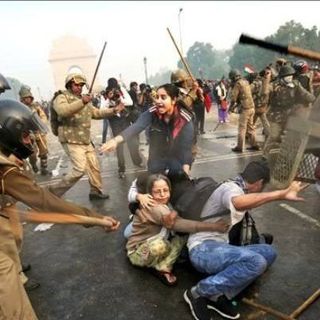
It’s Time We Stop Dismissing Content That Is Propaganda
Today, everything is propaganda — from feminism to nationalism. It doesn’t mean we stop engaging with it.

Greta Thunberg trying to spread awareness about the climate crisis and urging governments to act immediately; Prime Minister Narendra Modi saying clothing style can identify the people wrecking violence in Delhi (largely interpreted as referring to Muslims); Jameela Jamil laying siege on beauty norms on social media — all of these examples have one thing in common: they’re all propaganda.
“Propaganda is a form of persuasion used to influence people’s attitudes, beliefs and behaviors,” which is used to spread “ideas, information, or rumor for the purpose of helping or injuring an institution, a cause or a person,” according to the authors of War and Peace: Media & War, Johnnie Manzaria and Jonathan Bruck. Today, everything is propaganda — from feminism to nationalism. The problem is, we only categorize ideas we’re opposed to as propaganda, never once considering our beliefs could be so.
And once we categorize something as propaganda, our reaction to it is that it’s bad, misleading, and manipulative. While that’s not necessarily true, it’s a commonly held belief that enables people to quickly dismiss the validity of any cultural content or political opinion they deem as having a hidden, greater agenda, especially one they disagree with. For example, when Uri released in January 2019, many critics called it propaganda and the government’s mouthpiece, which then dissuaded people from either watching the movie or engaging with its themes at the time.
The problem with dismissing propaganda as thoroughly bad lies in the ubiquity of the phenomenon — today, propaganda doesn’t only come from political parties or the government trying to rally public sentiment during wartime (the two most common sources of propaganda in the past). Today, with the reach and access of social media, anything disseminated to or consumed by the masses that peddles an idea is propaganda, from memes to videos. It can be about people’s everyday struggles in society, new socio-political ideologies, or anything in between. Memes making fun of hustle culture is as much propaganda as anti-NRC-CAA graphics, or Republic TV spewing pro-BJP, anti-Muslim vitriol.
This ubiquity sheds light on why we need to stop dismissing content once we identify it as propaganda. “People are given to the verbal practice of describing only the opposed viewpoints as ‘propaganda,’ while refusing to admit that their own arguments could be so categorized,” writes Canadian author and an expert on logical fallacies, Douglas Walton.
Because of the negative connotations attached to the word, an anti-NRC-CAA protester could consider Aaj Tak news as propaganda, but fail to see their own critique of the news channel as propaganda, too — thus making it easier for right-wing thinkers to then dismiss their critique. Feminism, for example, is also often dismissed as propaganda by men’s rights activists — who are also dismissed by feminists as propagandists. Both treat each other’s ideologies as inherently manipulative or deceiving, and therefore not worthy of engagement. The danger with dismissing all content as propaganda, then, is to instantly dismiss a warring opinion as manipulative and untrue, without engaging with its content on a deeper level.
Related on The Swaddle:
91% of 15-Year-Olds Can’t Separate Fact From Opinion
How did the word come to have such negative connotations? Blame George Orwell. In his diary in 1942, the author noted, “All propaganda is lies, even when one is telling the truth.” Throughout the Cold War, newspapers and governments in the West weaponized “propaganda” as any public communication from the Kremlin, a practice still in use today as governments try to protect against Russian intervention in elections done via fake news.
More recently, Huw Lemmey writes for New Humanist, “claims that the public are being misled by centralized propaganda don’t account for the fact that both the propaganda being shared and the ideas involved are often rising up from the grassroots,” such as from artists and writers often attempting to shed light on classist, casteist, and sexist rhetoric. Today, Lemmey adds, “it matters less whether the opinions are balanced and more that they resonate with their audience.”
However, how to identify and engage with propaganda is essential — step one: don’t dismiss an opposing view as propaganda just because it peddles an ideology and uses persuasion tactics (appealing to one’s emotions or sense of belonging, for example); arguably, most arguments today do so. The key to identifying propaganda is to look beyond these tactics, and engage with the validity of the content itself; for example, is it based on facts? Does it relay people’s experiences fairly?
An expert in mind control tactics, American psychologist Phil Zimbardo, has more tips:
Be aware that every idea is framed from a person’s perspective — there is a ‘spin’ to everything — that requires taking in information with multiple grains of salt, Zimbardo writes. In addition, it helps to be aware not just of the individual’s perspective, but also any group pressures and authority figures they cite or match their ideas to. Lastly, Zimbardo adds, “Don’t believe in simple solutions to complex personal, social, and political problems.”
Adding this layer of critique to content perceived as propaganda is time-consuming, and not everybody will have the inclination to dig. However, Zimbardo adds, “the minute we stop observing with a critical eye, we have already been persuaded.” And today, with right-wing governments increasingly wielding fake news to spread hate, a critical eye is a weapon that needs to be in everyone’s arsenal.
Rajvi Desai is The Swaddle's Culture Editor. After graduating from NYU as a Journalism and Politics major, she covered breaking news and politics in New York City, and dabbled in design and entertainment journalism. Back in the homeland, she's interested in tackling beauty, sports, politics and human rights in her gender-focused writing, while also co-managing The Swaddle Team's podcast, Respectfully Disagree.
Related


Thousands of Mexican Women Disappear in Protest of Femicide
